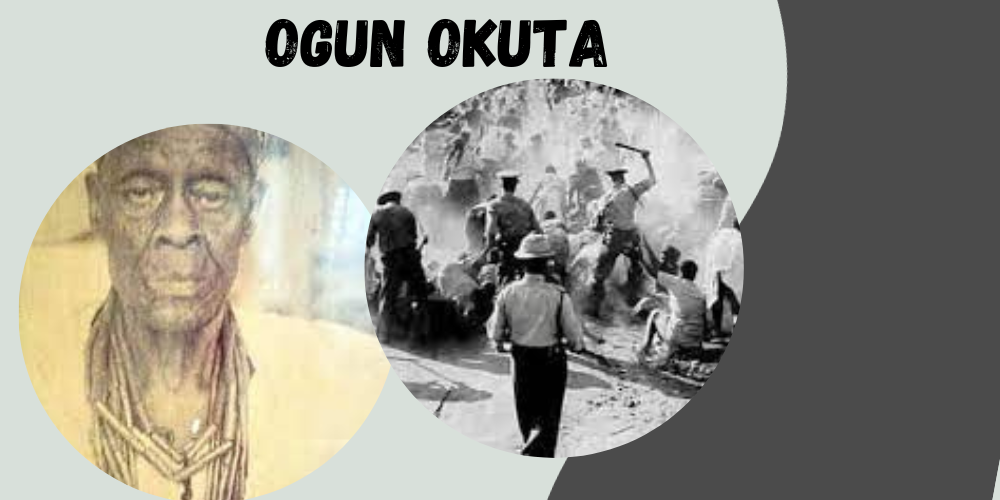The History of Ogun Okuta in Akure can’t be explained without pointing to Taxation. Taxation has never been part of the pre-colonial Yoruba society. The closest thing to any form of tax in Yorubaland during the pre-colonial period was called Isakole (Isakole is an indigenous form of tribute or can also be called ground rent paid to one’s benefactor, indigenous land owners, chiefs, and Oba and it’s majorly done with harvested agricultural products). Also, a powerful Neigbouring community can collect “Isakole” from weak Neighbouring communities and some pay Isakole to their Neighbouring Town due to political or military issues. Thus, Isakole is a tribute in the pre-colonial Yoruba communities that comes as an agreement between the collector and the person paying.
British and Taxation
The Advent of the British in Yorubaland in the early 1840s didn’t bring any form of taxation in the Yoruba precolonial system or change the Isakole of the people. However, by the time the British entirely took over Nigeria in 1900. The British decided to practice indirect rule.
The British Indirect rule led to the creation of the Native Authority Ordinance. In 1917 The Native Authority Revenue Ordinance introduced direct taxation to the southern protectorate. The implementation of the Native Authority Ordinance in Yorubaland marked a pivotal moment as it ushered in direct taxation and expanded the administrative and judicial powers of the Oba who supported the British.
The introduction and forceful imposition of tax led to several resistance in places across the southern protectorate like Ijemo in 1914, Isehin/Oke-Iho 1916, Erunkoja crisis of 1948. This contributed to the History of Ogun Okuta of 1931.
Akure before Colonialism
Akure was one of the largest cities in the pre-colonial southern protectorate. Before the Adevent of the British, the Akure political institution just like other Yoruba communities was headed by the Oba (King) called Deji of Akure and supported by chiefs. The Deji of Akure title is a hereditary position. The Deji as a celestial king possesses unrestricted authority. He was recognised as the “lord of the earth and life,” or “alayeluwa.”
The Deji of Akure was treated with respect by his people as he possessed the power to not be questioned. However, he was not the only one in power. A council of chiefs supported him, with the Iare, the Ikomo, the Ejua, the Ogbe, and the Owose being the most significant. All civil and criminal cases were heard by the Deji court, which also reached verdicts. This court has the authority to impose death sentences as a form of capital punishment. One of the Deji’s chiefs, Omolaare, oversaw the traditional police, which was in charge of carrying out the rulers’ judgments. The Deji made decisions regarding the appointment and removal of chiefs and village leaders based on the counsel of pertinent authorities (elders, chiefs, etc.). However, the Ogun Okuta Event challenged the Deji power.
British Into Akure
British interaction with Akure dates back to the 19th century. For instance, A Hausa Constabulary detachment was stationed at Akure precisely on the eve of the British government, under Lieutenant A.O.C. Scott, in 1897. Due to the creation of the North Eastern District of the Lagos Government in 1899, where Akure was located, eight officers were in charge of the detachment until it was evacuated in March 1900. The Akure District was moved to the Eastern Division’s Ondo headquarters in June 1901. All these were before the Ogun Okuta.
Also, The Yorubaland was divided into six administrative districts, each of which was governed by a British Travelling Commissioner with the help of a colonial police detachment. The Central District, which included the cities of Ibadan, Oyo, and Ife, had its administrative centre in Ibadan. The Western District included the current Egbado Division, which had its headquarters in Badagry, Imeko, and Ilaro. The administrative centres for the North-Eastern District were Ilesa and Ado-Ekiti, respectively, while the administrative centre for the Eastern District, made up of Akure, Owo, Idanre, Ondo, and Okitipupa, was located in Ode-Ondo.
However, Akure was one of the peaceful communities during the pre-colonial era and even during the colonial era in the southwest of Nigeria. Despite the community was full of different people from different backgrounds.
Oba Afunbiowo
Oba Olofinlade Afunbiowo Ojijigogungara Asodeboyede, The 41st Deji of Akure kingdom. Shortly after ascending to the throne, the missionaries, led by the late Rev. Ogunbiyi of the CMS, made their first entry into Akure, three months into the reign of the new Deji, Afunbiowo Adesida the First. Recognizing the potentially transformative impact of the missionaries, the Deji sought to establish a favourable relationship with them. However, when the colonial government introduced official tax collection in Akure for the first time, Oba Afunbiowo sided with them, much to the discontent of the people.
This oppressive tax sparked a riot known as the “Ogun Okuta” or the “Battle of the Stone Pellets” in Akure. The Palace came under siege, and the Deji himself was stoned by his own people for aligning with the colonial government’s forceful tax collection.
Despite the rebellion, the Deji remained steadfast and managed to quell the insurgents, restoring order in Akure. the Ogun Okuta was the first time in Yoruba land that the King was stoned by his people most especially overtaxed.
The Ogun Okuta incident
The Ogun Okuta incident in the Akure division of Ondo Province, Southern Nigeria, shows the indigenous uprising against the colonial administration in Akure, triggered by the oppressive tax policies imposed by the British officials and their collaborator, Oba Afunbiowo.
It is significant to note that traditional rulers in the area and throughout Nigeria have received limited political power in the governance of their subjects ever since the British invasion. However, some of these Traditional leaders were used as pawns by the British against their people just like what is seen in the History of Ogun- Okuta conflict.
The History Of Nigeria’s Naira notes



